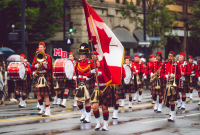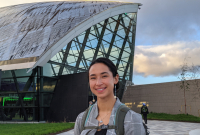A youth-led social media campaign launched this month attempts to unpack decades of historical trauma that makes some Indigenous people reluctant to get a COVID-19 vaccine.
The My Vaxx Journey project invites young Indigenous people across the country to share their stories of facing fears related to getting the vaccinations. The project runs until the end of March and participants will have a chance to win one of 150 donated pairs of retro Air Jordans.
Jenna Chisholm, a young Mi'kmaw woman in Halifax, has been involved in the youth working group behind the campaign since its formation 10 months ago. She says the team spent a lot of time playing devil’s advocate to understand and respond to concerns “rooted in historical trauma” that created distrust of government initiatives.
“Because of what all our people have been through when it comes to our relationship with the government, like the Sixties Scoop, MMIWG (missing and murdered Indigenous woman and girls), residential schools, day schools, I think a lot of times in our communities that causes a mistrust of the systems that are in place, and we were seeing that reflection in the youth,” the 25-year-old said.
She said a common misconception raised was that the vaccines were being tested on Indigenous folks when they were in fact being given earlier access as members of a more vulnerable group. A specific group was formed to work through the fertility concerns of younger women.
The videos that have been posted since the launch refer to unease about medical facilities and the health-care system, where systemic bias remains a major obstacle, but point out Indigenous health centres can also administer the jabs.
There is also a strong emphasis on how getting vaccinated helps protect not only the individual but their family and community, Chisholm said.
“If we lose one elder, we lose so much more than just that one person, we lose all of the stories,” she said. “So we really focused in on protecting our communities and protecting our most vulnerable.”
While Ontario has relatively high vaccine confidence overall, that dips among individuals with lower household income, those unable to work from home, and those who self-identify as a race other than white European, according to a large-scale survey released in October by the province's science advisory table.

“We have seen, more so in urban areas like Toronto, if we are looking at youth 20 years and up, the vaccine uptake has not been as high as among non-Indigenous people in those settings,” said John Paillé, a Toronto-based project co-ordinator at the National Association of Friendship Centres (NAFC), which partnered with the Indigenous youth working group to deliver the campaign.
More than 28,000 people responded to the science table's online survey, conducted over the first six months of 2021. Of those who chose to take part, almost half said they’d definitely get the vaccine and more than a quarter said they’d probably get it. The high confidence number falls to 34 per cent among Indigenous people, with 30 per cent somewhat supportive.
Paillé said the campaign aims to increase confidence and uptake of COVID-19 vaccine by engaging in the myths, truths and feelings involved, but that it is also about encouraging Indigenous youth to share their voices with each other to “get that experience of being part of discussions on topics that affect them directly.”

“The campaign is not supposed to be a shame campaign,” he said. “We don’t want to criticize people for not having the same views, but we want to make sure there’s opportunity for open and honest dialogue.”
Chisholm said the feedback so far, especially from elders, has been overwhelmingly positive.
“I feel like everyone is more apt to support something if it is youth-led,” she said. “They are so proud of the young people for coming together and making something happen.”
Morgan Sharp / Local Journalism Initiative / Canada’s National Observer







Comments